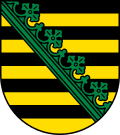Michael Kretschmer | |||||||||||||||||||||
|---|---|---|---|---|---|---|---|---|---|---|---|---|---|---|---|---|---|---|---|---|---|
 Kretschmer in 2024 | |||||||||||||||||||||
| Deputy Leader of the Christian Democratic Union | |||||||||||||||||||||
| Assumed office 31 January 2022 | |||||||||||||||||||||
| Leader | Friedrich Merz | ||||||||||||||||||||
| Preceded by | Volker Bouffier | ||||||||||||||||||||
| Minister-President of Saxony | |||||||||||||||||||||
| Assumed office 13 December 2017 | |||||||||||||||||||||
| Deputy | Petra Köpping | ||||||||||||||||||||
| Preceded by | Stanislaw Tillich | ||||||||||||||||||||
| Leader of the Christian Democratic Union of Saxony | |||||||||||||||||||||
| Assumed office 9 December 2017 | |||||||||||||||||||||
| General Secretary | Alexander Dierks | ||||||||||||||||||||
| Deputy | Barbara Klepsch Christian Hartmann Thomas Schmidt | ||||||||||||||||||||
| Preceded by | Stanislaw Tillich | ||||||||||||||||||||
| General Secretary of the Christian Democratic Union of Saxony | |||||||||||||||||||||
| In office 1 December 2004 –9 December 2017 | |||||||||||||||||||||
| Leader | Georg Milbradt Stanislaw Tillich | ||||||||||||||||||||
| Preceded by | Hermann Winkler | ||||||||||||||||||||
| Succeeded by | Alexander Dierks | ||||||||||||||||||||
| |||||||||||||||||||||
| Personal details | |||||||||||||||||||||
| Born | Michael Kretschmer 7 May 1975 | ||||||||||||||||||||
| Political party | Christian Democratic Union (since 1989) | ||||||||||||||||||||
| Spouse | Annett Hoffmann (m. 2020) | ||||||||||||||||||||
| Children | 2 | ||||||||||||||||||||
| Residence(s) | Dresden-Klotzsche Waltersdorf | ||||||||||||||||||||
| Alma mater | |||||||||||||||||||||
| Website | michaelkretschmer | ||||||||||||||||||||
Michael Kretschmer (born 7 May 1975) is a German politician of the Christian Democratic Union (CDU) who has been serving as Minister President of Saxony since December 2017. [1] Since 2022, he has been one of four deputy chairs of the CDU, under the leadership of chairman Friedrich Merz. [2]
